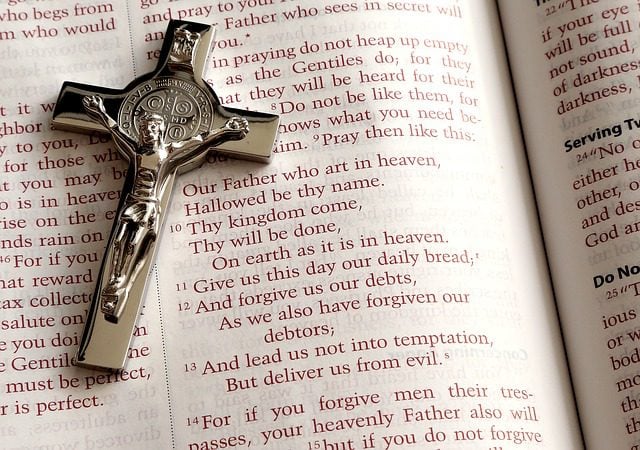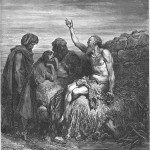[M]ost Catholic authorities admit that Mary died. According to Paul (Rom. 5:12), however, death is a punishment for sin. It begs the question to say that Mary did not die a natural death; if she was sinless, why should she die at all? She should have been taken bodily into heaven without death. The fact that Mary died shows that she was not exempt from punishment due to inherited original sin, and thus reveals that she must have had original sin. (p. 315)
The fundamental fallacy here is that a sinless person cannot die, and that every death signifies a punishment for actual sin and original sin. This is refuted by the fact that Our Lord Jesus died, yet was without sin: actual or original. If He can die, certainly a created human being can die, and may also be without sin. The possibility is not at all ruled out.
There are several biblical examples of people who were bodily taken up to heaven, having died or without having died. These are, in turn, analogous to Mary’s Assumption:
Genesis 5:24 (RSV) Enoch walked with God; and he was not, for God took him.*Hebrews 11:5 By faith Enoch was taken up so that he should not see death; and he was not found, because God had taken him. Now before he was taken he was attested as having pleased God.*2 Kings 2:11 And as they still went on and talked, behold, a chariot of fire and horses of fire separated the two of them. And Eli’jah went up by a whirlwind into heaven.*2 Corinthians 12:2-4 I know a man in Christ who fourteen years ago was caught up to the third heaven — whether in the body or out of the body I do not know, God knows. [3] And I know that this man was caught up into Paradise — whether in the body or out of the body I do not know, God knows — [4] and he heard things that cannot be told, which man may not utter.*1 Thessalonians 4:15-17 For this we declare to you by the word of the Lord, that we who are alive, who are left until the coming of the Lord, shall not precede those who have fallen asleep. [16] For the Lord himself will descend from heaven with a cry of command, with the archangel’s call, and with the sound of the trumpet of God. And the dead in Christ will rise first; [17] then we who are alive, who are left, shall be caught up together with them in the clouds to meet the Lord in the air; and so we shall always be with the Lord.*Revelation 11:11-12 But after the three and a half days a breath of life from God entered them [God’s “two witnesses”: 11:3], and they stood up on their feet, and great fear fell on those who saw them. [12] Then they heard a loud voice from heaven saying to them, “Come up hither!” And in the sight of their foes they went up to heaven in a cloud.
From these examples, we can logically conclude several things (all contrary to Geisler’s arguments):
1. There is such as thing as a human being taken bodily to heaven without having died, or (as in Paul’s case) even before death (Enoch, Elijah, St. Paul [possibly bodily], believers alive at the Second Coming).
2. There is also such a thing as dead believers being revived and taken supernaturally to heaven (believers dead at the Second Coming and the “two witnesses” of Revelation 11).
3. Thus, whether Mary died or not, there is ample precedent for each type of bodily assumption into heaven. If it is possible for these men, why not also Mary, the Mother of God the Son? It’s both plausible and possible, even if not explicitly proclaimed in Scripture.
4. It’s Geisler who argues that a sinless person “should have been taken bodily into heaven without death.” Thus, by his reasoning, Enoch and Elijah would be two such men. If we grant his premise, then they were sinless and thus as a result, were bodily assumed into heaven. This shows both the possibility of a sinless created human being and a bodily assumption of same: precisely the two elements of Mary’s Assumption. We know that it is entirely possible for such things to happen: from these biblical examples, that record historical events.
5. Moreover, the Bible never states that there could be no creature without sin. The angels (excepting the fallen ones, or demons) are sinless and always have been. They never sinned. They never rebelled against God. They’re creatures as we are, with a free will to sin or not sin. Adam and Eve were originally sinless and could have remained so had they not rebelled against God’s commands. “All have sinned” doesn’t necessarily mean “absolutely all, with no exception”: as I have explained in another article. Nor does such a statement include Jesus, Who never sinned. Indeed, we have at least two instances where it is at least possible for a sinless life (including holiness in the womb: similar to the Immaculate Conception):
Jeremiah 1:5 “Before I formed you in the womb I knew you, and before you were born I consecrated you; I appointed you a prophet to the nations.” (KJV: “sanctified thee”) (cf. Sirach 49:7 . . . he had been consecrated in the womb as prophet, . . . Is 49:1, 5 [Isaiah the prophet])
“Consecrated” or “sanctified” in Jeremiah 1:5 is the Hebrew word quadash (Strong’s word #6942). According to Gesenius’ Hebrew-Chaldee Lexicon of the Old Testament (Grand Rapids, Michigan: Baker Book House, 1979 reprint, p. 725), in this instance it meant “to declare any one holy.” We know Jeremiah was a very holy man. Was he sinless, though? Perhaps he was. I don’t recall reading accounts of Jeremiah sinning.
We know, after all, that the Bible is very frank about exposing sins where they existed (David’s adultery, Noah’s drunkenness, Moses’ murder, Isaiah’s “unclean lips,” Elijah’s and Jonah’s lapses of faith, Doubting Thomas, Peter’s betrayals, Paul’s persecutions, etc.). Therefore, though the lack of such an account of sin does not prove sinlessness, it is consistent with its possibility. We also have the example of John the Baptist:
Luke 1:15 for he will be great before the Lord, and he shall drink no wine nor strong drink, and he will be filled with the Holy Spirit, even from his mother’s womb.
We know that John the Baptist was also a very holy man. Was he sinless? We can’t know that for sure from the biblical data. I don’t recall any mention of a sin from John the Baptist, either, in Scripture. St. Catherine of Siena, for one, believed that he never sinned (A Treatise of Prayer). But we know that he was sanctified from the womb. St. Paul writes similarly about himself:
Galatians 1:15 . . . he who had set me apart before I was born, and had called me through his grace,
6. Furthermore, we know that even believers of varying levels of sanctity can be bodily taken to heaven in a supernatural way (at the time of the Second Coming). If it will happen for those not perfectly sanctified, how much more is it plausible for a person without sin or at least (for those who — wrongly — believe that she committed some sins) of very high sanctity, like Mary? It’s perfectly plausible.
7. Lastly, if it is objected that arguments from plausibility (something less than demonstrated fact or logical undeniability) are impermissible, why is it that Protestants themselves not only make them, too, but must make them in order to have a canon of Scripture? There is no ironclad proof in Scripture of which books may be considered Holy Scripture. There is no strictly biblical argument at all. It’s an argument entirely from tradition and Church authority. Since Protestants deny the infallibility of both, for them, reasons given for inclusion into the canon are entirely of the nature of arguments from plausibility (“book x is inspired and part of the Bible because of reasons a, b, c . . .”). Geisler himself makes several such arguments in his books on the biblical canon. These sorts of arguments are not airtight and must ultimately be accepted on faith.
Thus it is with Catholics and Mary’s Assumption. If Protestants reason in this way as regards the biblical canon, why can’t we do the same thing with regard to Mary and her Assumption? Both are articles of faith, not explicitly laid out in Scripture. Goose and gander . . . pot calling the kettle black . . . In fact, there is more indirect evidence of Mary’s Assumption in Scripture than for the canonicity of biblical books; not to mention a central doctrine in Protestantism such as sola Scriptura (only Scripture is our final infallible authority): for which there is no biblical evidence whatsoever. It’s merely an unbiblical tradition of men: a binding Protestant belief that has no biblical support at all.
*****


















